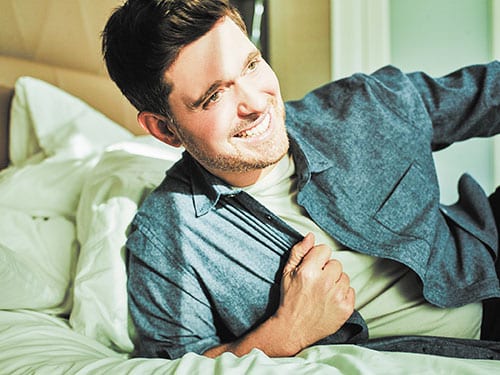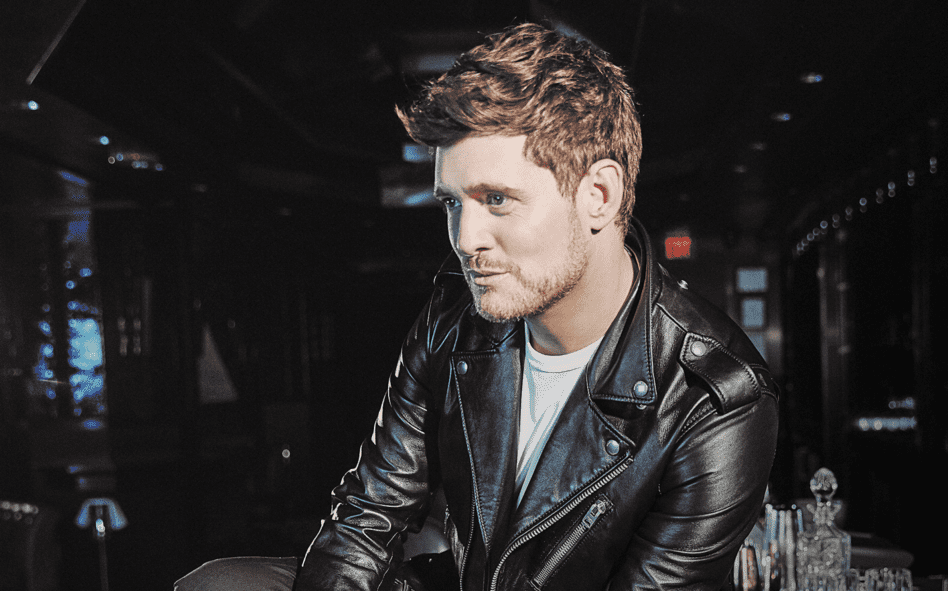How the crooner hopes his new album has healing powers, and why he may one day sing ‘Santa Baby’
You’re my first. Be gentle with me. Can we start with, like, a foreplay thing where you can just take it easy on me? Some gentle licking perhaps, and then we’ll get into the heavy stuff.”
And so my interview with Michael Bublé, who has almost made me forget he has a wife, Argentine actress Luisana Lopilato, begins.
Returning to music with a new heart-emoji-titled album called Love that he will support on a world tour in 2019 — including a stop at American Airlines Center on March 25 — Bublé, who introduces himself by that mononym when he rings me, spoke openly on a variety of topics, including the difficulties of being a public figure amid familial distress, atoning for his “sexist” Christmas song and doing his part to support the LGBTQ community. █
— Chris Azzopardi
Dallas Voice: It’s sweet that this album uses the heart emoji for its title, though the gay community certainly wouldn’t have argued with you naming your album using the eggplant emoji.
Michael Buble: Oh god, I wanted to use the eggplant. You have no idea.
You fought for that.
I did. I had long conversations about it. And you think I’m joking. I’ve already said this a million times when talking to my friends: They were like, “Why didn’t you use the eggplant?” and I’m like, “Oh, I would have.”
Did you intend for the album to be a Band-Aid for our divisive times?
Yeah, it’s funny that you just said that: I’ve actually said that in private. You know what, man, obviously everything I’ve gone through has everything to do with this record and what I want to put out to the world. I had different names that I’d come up with, but there was nothing that really explained the record and the concept as well as just one word could.
The record is about love, but it’s not simply about romantic love. It was really a record that was kind of my theory on this word, this emotion that has so much range. When you hear it you think, “Oh god, romantic and lovey-smovey,” but there’s so many different things that happen with that word.
“When I Fall in Love” is such a beautiful track and people say, “Oh, it’s so romantic.” It is romantic. But for me, it’s really sad. As I put myself into the character of that song, I thought about a guy sitting at the bar at 4 o’clock in the morning, drunk, looking over at another couple, wishing that he had that because it hasn’t happened for him. It’s very unique in that way. It’s a very sad song about longing. I could go on through the whole tracklist. They all have a story for me.
Did you personalize any of the songs?
I wanted to do the best I could to be as personal and honest in the storytelling, in becoming the characters for the song, but at the same time give the audience a way to be able to hear and have their own opinions.
 If I want to use this album to get a guy to fall in love with me, which song do you suggest I play to make him swoon?
If I want to use this album to get a guy to fall in love with me, which song do you suggest I play to make him swoon?
Honestly, I think “La Vie En Rose” [sung as a duet with jazz artist Cecile McLorin Salvant] is incredible, because when I did this song, my concept was to build a mirror of the relationship I had with my wife. It was me going to this foreign land with someone who didn’t speak my language and having this kind of dance of love with them.
I felt like there were these two characters and one is singing to the other, where I was singing to her in my language and my culture and she was answering in hers. Though we were on this path together, we were still apart; and by the middle of the song we have this beautiful dance together, this incredible night, and by the morning we were walking through the streets of Paris. I have sort of assimilated to her culture and I am singing in her language, and I loved that because that’s exactly what happened in my life.
I don’t think you thought you’d be recording music again after your 5-year-old son, Noah, was diagnosed with liver cancer in 2016. But I’ve heard you say he’s holding up and is in remission. Was creating this album more cathartic than past albums?
I don’t think I ever fell out of love with making music or being a creative person; I just think I knew it had to be put aside. The part of being a public person, that part I didn’t know if I was ready for. There are always reminders every time you go out and people speak and you’re trying to move on with your life or yourself and your family. At first, there were always these reminders of it, and so it was hard to just move on.
I made a promise to myself that it would be organic and that it would be joy and it would be blissful — and if it ever becomes what I consider work, or egotistically driven, then I would step away. But I never fell out of love with making music. You know, I’m having to leave the family and stuff for little bits, and if I do then it has to be for the right reasons.
Harder than usual to leave the family right now?
No, it’s not. When I do something, I know that there’s a great reason for it. We can make more money, and we can make more music, and we can make more this and more that, but it’s time — you can’t make time. I wanna make sure I’m spending time doing what I love and that it’s all worthwhile.
You talked about being an LGBTQ ally in our last interview. Why did you decide to express your compassion and advocacy for the LGBTQ community at that moment in your career?
I don’t know if it was about that moment. I think I had an opportunity to speak with you, and I felt like it was a really good chance to say how I felt. Now more than ever I think it’s important for me to just be honest, and it’s what I believe. It’s part of who I fundamentally am, how I was raised. And it’s about equality. It’s simple. That’s it.
I wish it were so simple. When we last spoke, Trump hadn’t been elected, and a lot has changed in the last couple of years politically. How are you feeling about the way this administration has treated the LGBTQ community and other marginalized groups?
I don’t… [pause]… it sounds crazy, but after what I’ve been through, I really promised myself that I would try not to get into — and when I say “get into,” I just didn’t want to be a part of negative things. So I stopped reading things. I stopped reading things about myself. I stopped reading things that made me feel badly.
I really, truly feel like more than ever in my life, actions speak much louder than words do and how you treat people is. … It’s funny, a friend heard me talking to my son. My son was going to his first day of kindergarten, and he saw me kneel down to my boy and I said to him, “Noah, I just want you to know that” — and it sounds like a cliché, but I said, “You treat people the way you want to be treated, kid.” I said, “If you’re kind to people and you’re good to people, life will always be OK for you.” And I got up and I walked away and my friend said to me, “They may not remember what you did or what you said, but they’ll remember how you made them feel.”
I can’t stop the politicians or stupid, uneducated people from thinking and saying and doing stupid things, but I can make a stand, I can talk to you, and when I’m with groups of friends or I’m in public places or when I’m with people who I think can use that sense of love and education, I can open my mouth and tell them how I feel. And one at a time, you can change the world like that.
Listen, I’ve gone through too much not to feel this way. I just feel this way really strongly. I also think it’s important — it’s really easy for someone selling something, an artist, to say that they support or love the gay community; I just think it’s a different thing to say it than to do it.
Knowing what Noah has gone through, has the feeling of loving your kids no matter who they are, which we discussed in 2016, intensified in the last couple of years?
No, it was always the same. I could tell you the truth: I never had to find that perspective, I always felt that way. And I think I’m very lucky because I really do think that came from the way I was parented. I really do think I was very lucky to be raised in a family that was so open and liberal and loving. I just think they were always so unconditionally loving — not just toward us children, but toward our family.
Again, clichés, but I just tell both of my boys now that they’re old enough to understand: “You know, boys, the things that make you different are what makes you special.” What’s amazing to me about that school and wanting so badly to go to that school is, I just feel so strongly that the difference between a child and an adult is only life experience. An adult’s life experience is, “It’s gonna get better. This isn’t how it has to be, and this isn’t how it’s going to be.” So for me, it’s really massive to be able to meet kids and to say publicly really: “It’s not going always going to be like this.”
In light of the holidays, you do realize your gay fans would’ve gone wild for a version of “Santa Baby” by you that was actually called “Santa Baby,” right?
[Laughs] Yeah, exactly. Instead of “Santa Buddy.” I think I used “Santa Baby” in one of the lines.
You did.
I should’ve gone full.
I mean, a straight man can shop at Tiffany’s.
Yeah — no, you’re right. It’s funny: When I did that song, I tried to put it into my perspective and modernize it. I changed words; I asked for a Rolex or Mercedes or things I would want. The best part about it is: I get to sing those kinds of songs now in my life, and if I do concerts and I wanna add a Christmas song, then you know what? I can amend it and I can sing “Santa Baby.”
A straight guy singing “Santa Baby” is the progress we need.
Fuck yeah. You’re right, you’re absolutely right. It was sexist of me not to.
I’m looking forward to your live rendition of it.
I’ll do it for you. That’s a promise. I promise I’ll do it for you, even if it’s not fucking Christmas.
Even if it’s the middle of summer?
You think I’m kidding, but you shout it out, and I promise you I’ll get it done. Madison Square Garden, fucking done.












